Planning is not fun. It is not sexy. You want results fast and with least amount of pain as possible. I’d even bet that you’re willing to bypass planning to get to “doing” as fast as possible!
But when it comes to your tweets, investing effort BEFORE you create social media content will actually save you time. Action without a goal and a plan is like driving without knowing your destination. You need to know where you’re going first to figure out how to get there.
Plenty of experts tell you that you need a content plan if you don’t want to waste time on social media marketing. And, they’re correct!
In fact, planning your goals and your strategy makes you more effective and more likely to reach your goals.
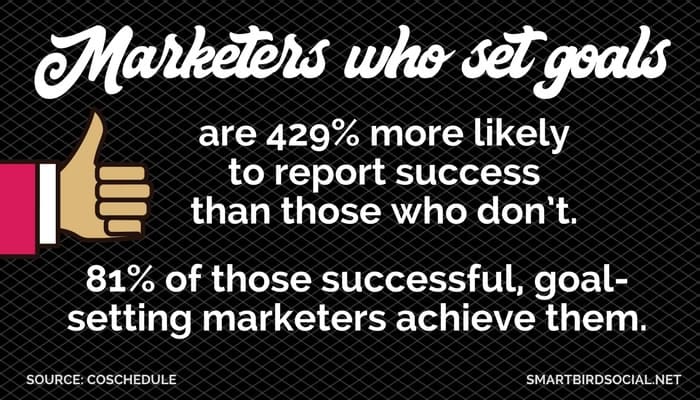
According to Coschedule, marketers who set goals are 429% more likely to report success than those who don’t. 81% of those successful, goal-setting marketers achieve them! And, their research showed marketers with a documented strategy are 538% more likely to report success than those who don’t.
Unfortunately, the advice you find online often falls short for small business marketers and solopreneurs. Much of the information is targeted at large companies with multiple people. Also, the guidance is either too broad or too complicated, especially since traditional marketing plans are directed to higher level goals—not social media content tactics.
You need a usable, actionable plan of attack that you can establish in a timely, efficient manner. You don’t have a few weeks to devote to planning!
Here’s Why I Developed My Own Way to Plan Social Media Content
I’m just like you! Making content choices at the spur of the moment wasn’t producing the results I desired (or required). I found lots of GSOT and GOST examples for marketing planning (Goals, Strategies, Objectives, and Tactics), but they were more organizationally focused.
None of the guides or plans I found were helpful in planning my actual content. As a creative person, I prefer visualization and try to avoid math as much as possible. (LOL!) So, I developed my own method for social media content planning, beginning with Twitter.
Does this process work for other platforms?
Yes! If you don’t use Twitter for social marketing, you can apply most of these principles to other platforms.
I concentrated on Twitter when developing this methodology because it requires the most content and has the strictest limitations. If the content fits and works on Twitter, it usually works on other platforms. Of course, there are exceptions. For example, Instagram supports more hashtags and Pinterest may not support the same visual content as other platforms.
Personally, my Twitter Content Plan and Roadmap are how I manage social media posting across all of my social channels. However, I don’t use that many platforms on a regular basis. After all, it’s just me and I gotta maintain my sanity, am I right?!
Why is Twitter Content Planning Critical to Your Business?
Randomly tweeting may have its merits, but for the most part, planning your Twitter content makes it more targeted, relevant, and goal driven.
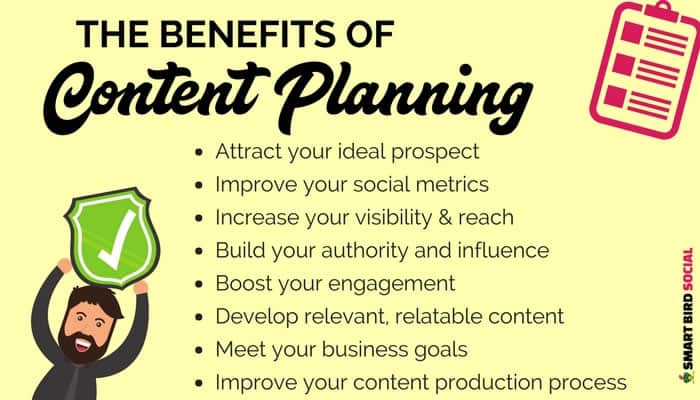
There is a place for spontaneity in your Twitter feed! But when it comes to your evergreen content, planning provides several advantages. You will:
- Attract your ideal prospect
- Improve your social metrics
- Increase your visibility & reach
- Build your authority and influence
- Boost your engagement
- Develop relevant content that your fans relate to & helps solve their issues
- Build a community within a niche
- Meet your business goals
- Create a content production process that suits your individual needs
Planning makes your content more effective! As a result, it pushes you ahead of your competitors.
Writing and visual content skills certainly make content creation easier. However, planning makes the difference in how well your content performs with your audience—and how effective you are in attaining your business goals.
Knowing what content attracts your ideal prospect and grows your business is more than half the battle. That’s why you want to plan your content first.
How to Develop Your Own Twitter Content Plan and Roadmap
It’s possible that you’d rather wax your armpits than come up with a Twitter content strategy! But I’m here to tell you that there is a way to make planning your social media content easy and effective.
Before any tweeting commences, it helps to have a purpose and direction. A Twitter content plan helps you choose your destination and your path to it.
Step 1: Determine the Why, Who, What, and How
The most effective content starts with identifying your WHY. Your WHY points you in the direction you need to go. Begin with a broad goal and work your way down to more specific content tactics.
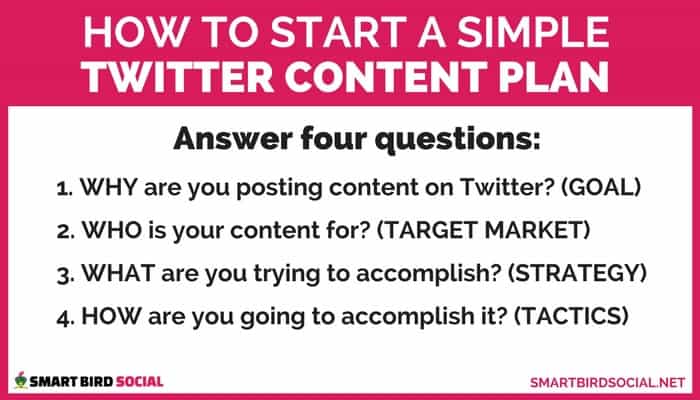
Answer these four questions:
WHY are you posting content on Twitter?
Identify your ultimate outcome goal for what you hope to accomplish by being present on Twitter. Keep it broad!
This goal is related to why you’re using Twitter as a marketing tool for your business. This isn’t an overall business goal.
**NOTE: Making money or increasing your revenue is NOT what I’m talking about here. Obviously, you need to make money to stay in business.
WHO is your content for?
Describe your target market or ideal prospect. Some people refer to this as a marketing persona. It’s okay to have more than one target market. However, start with one to keep things simple for now.
The more you know, the better. But, if you don’t have all of your persona’s details worked out, no problem! Begin with simple demographics and your ideal prospect’s biggest pain points.
WHAT are you trying to accomplish with your content?
Let’s go back to your WHY for a moment. Determine a few ways that you’re going to make your WHY happen. What strategy (or strategies) will you implement to achieve your goal?
Stick with just a few to keep things easy to manage. And remember, these strategies are related to things you can accomplish on Twitter.
HOW are you going to accomplish your WHAT?
Now the fun begins! Select the content types you will use to achieve your WHAT. These are the content tactics you’ll use to achieve your strategy and goal. Be very specific with your tactics. Feel free to include performance metrics if you desire. I recommend identifying three to six tactics because these evolve into your tweets and your content.
PRO TIP: Start small, especially if this is all new to you. Start with ONE WHY and answer the questions for it. Later, go back and go through this process again, creating a plan for EACH goal. This helps you reach multiple goals while making it MUCH easier to create a lot of highly targeted, relevant, quality Twitter content. (You should be tweeting at least 8-10 times a day!)
EXAMPLE ANSWERS FOR AN MLM CONSULTANT
Why are you posting content on Twitter?
To be recognized as a leader in my industry.
Who is your content for?
Moms over 30 who want to earn extra money working from home while their kids are in school.
What are you trying to accomplish?
Build and grow my team to reach a certain status within the MLM company.
How will you achieve your strategy?
Testimonials from team members 2x/day
Interview team members on live video 3x/week
Humorous mom memes 2x/day
Motivational quotes 3x/day
Product highlights 2x/day
Business tips 4x/day
Productivity tips 2x/day
Congratulations, your high-level Twitter Content Plan is done!
If you do nothing else, at least answer those questions. Doing so will improve your content! Your community and your business will thank you. 😉
Wondering how will you execute the Twitter Content Plan? A Content Roadmap is a terrific tool that guides my content in a more specific manner.
Step 2: Organize Your Tweets with a Content Roadmap
After you identify the high-level aspects of your Twitter content in a plan, now it’s time to plan your tweets.
A Content Roadmap is a spreadsheet that identifies your content on a more granular level. As you know, social media content is more than just strategy. To implement successfully and without too much chaos, you can plan the components of each post.

Using your content tactics from your Twitter Content Plan above (#4), begin to organize your tweets in a spreadsheet format. Beware! You’re still not writing/creating your actual tweets. This post is entirely about the planning phase.
Divide your content into different “buckets” based on type and category. “Buckets” refer to grouping your content by certain distinguishing factors, in this case, types and categories. Feel free to organize your content in a different manner. In my experience, these buckets work well (especially when it comes to scheduling your content, which we’ll discuss in a minute).
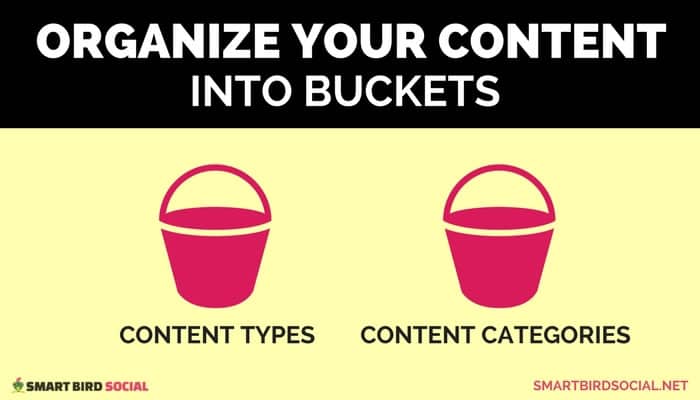
The type of content describes your tweet very specifically in terms of theme. The category of content is more of a broad description of what the tweet accomplishes in relationship to its purpose.
Examples of Content Types
- Blog post
- Quote
- Statistic
- Tip
- Behind-the-scenes
- Joke
- Freebie
- Promo
- Survey
Examples of Content Categories
- Informational/Educational
- Entertaining/Engaging
- Emotional
- Personal
- Promotional
- Social Proof
- Public Relations
- Customer Service
By doing this exercise, you get an accurate picture of the overall message you’re sending with your social content. You can visualize your content types and categories to ensure you don’t have too much of one category of content. For instance, you don’t want too much promotional content that focuses on you. The majority of your content should focus on giving value rather than asking for money.

I’ve found that organizing my content into buckets at this level improves my Twitter feed, making it more well rounded, diverse, and interesting. The days of using social media to share only blog posts are over! And, this process forces me into creating varied content tactics to carry forth my strategy that will attain my goal.
Every person is different, so set up the spreadsheet as you desire. Personally, I include the following information in my Roadmap:
- Content Type
- Content Category
- Why (why am I tweeting this content?)
- For Whom (aka target market)
- Visual Type
- Hashtags
- Links
- Frequency
Including these details in my Roadmap allows me to understand the purpose, intention, audience, and format for my content. Additionally, I’m able to calculate how much content I need for each content type/tactic.
After completing your Roadmap, you should have your marching orders for what content to create and how much of it you’ll need. This makes your life easier when it comes to content creation and scheduling!
Speaking of scheduling…
Step 3: Schedule Your Content Before It Goes Into Your Tool
After your Roadmap is done, you’ll know what content you need to create and how many tweets you need for each content type. Now it’s time to schedule your content. And, as you may have guessed, I plan this too! LOL
Perhaps your social media management tool has a scheduling feature, so you don’t plan out your tweets because the tool does it for you. I prefer to plan my content distribution manually before automating it.
This step is nothing more than creating a calendar in a spreadsheet format. Construct the document however it works best for you. I like my post times on the left and my days of the week across the top. Organize the calendar by either content TYPE or content CATEGORY.
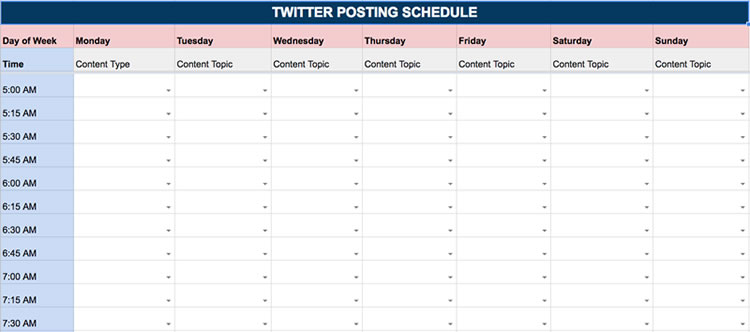
Your social media presence is the sum of its parts. In other words, your posts are viewed singly within a global feed but combined they send a message. And, people will visit your profile and see ALL of your content at a glance. So, scheduling your content into a spreadsheet by type or category manages your brand’s overall message while keeping your content varied and engaging.
Scheduling is easier, too, because you’ve organized your content into buckets. When it comes to actually creating your tweets, batch your creation process by type as time allows. Then, manually schedule your content by type into your social media tool based on the schedule you create. Even better, there are tools that allow you to schedule content into evergreen queues based on groupings, such as types and categories.
- eClincher
- MeetEgdar
- SocialOomph (affiliate link)
These tools are worth the investment! Manually scheduling your evergreen content is a waste of your time, especially when you’re tweeting at least 8-10 times a day. That’s a ton of content to manage on a weekly basis! Why not do it once and then just update it every month as needed?
You may resist this step in the process and want to skip it. But don’t! Planning when your social media content gets published makes a difference, both in content management and effectiveness.
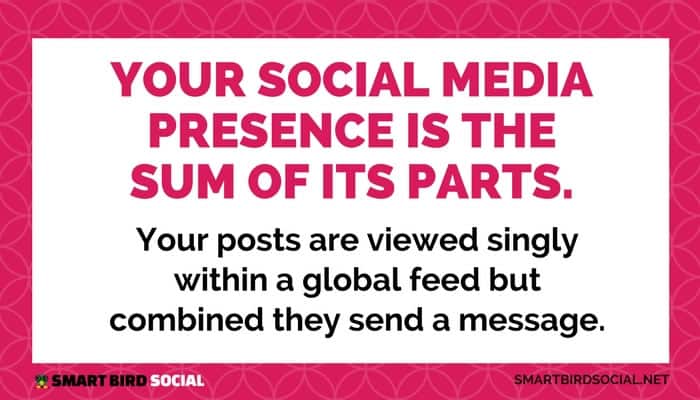
How the Twitter Content Plan and Roadmap Work in Tandem to Improve Your Tweets
This system is designed for evergreen content. “Evergreen” refers to content that is always relevant and that doesn’t expire (or doesn’t expire within a year or so). But, you can also plan your short-term content within this framework. It’s a simple way to stay on top of what content you need to create and manage to achieve your goals while giving value to your community.
Together, the Plan and Roadmap define the destination, direction, and path of your social media content. You won’t have to worry about what content to create, how much you’ll need, and why you’re investing time into social media. These worries are all eliminated once you spend a few hours PLANNING.
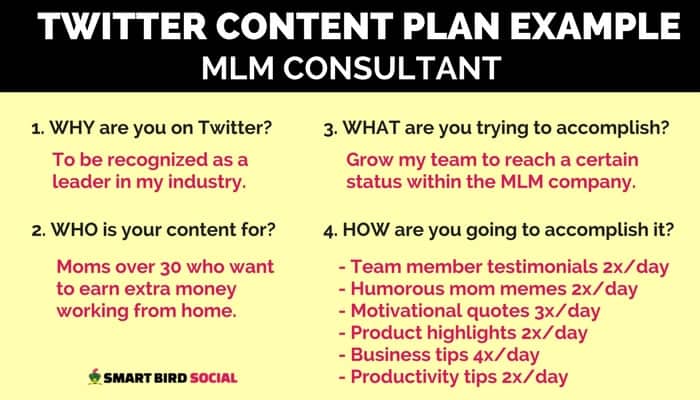
Another benefit to using the Plan & Roadmap is that you can visualize your content before it ever goes public. Your fans see your content in little bits and pieces within their greater global feed. But, you’re sending an overall message with your content. Maintaining a consistent, branded message and posting targeted, relevant content is tough without guidance.
The Plan and the Roadmap have boosted my effectiveness as a business owner as well as a marketer. Plus, my community is LOVING my content! I know this not just because of statistics but also because people are replying to me. And, if you don’t know this by now, engagement in the form of replies is much harder to achieve. 😉
Planning should not be a barrier to production and results. Don’t forego planning just to get stuff done. You want to be a doer, an action taker. You don’t have time for nonsense, which is why this system is perfect for you!

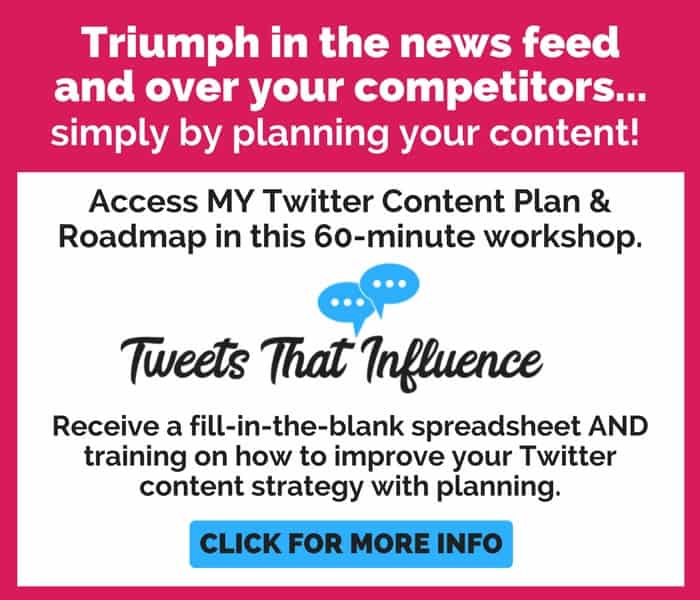
Super amazing content Meghan and you hit the nail on the head… so much easier to post for no purpose.. but then it becomes a waste of time.. duh!
Hello Kristen! You know I love my content planning spreadsheet and roadmap! 😉 My process has increased the effectiveness and engagement of my social media content, yay! Thanks for taking the time to comment.